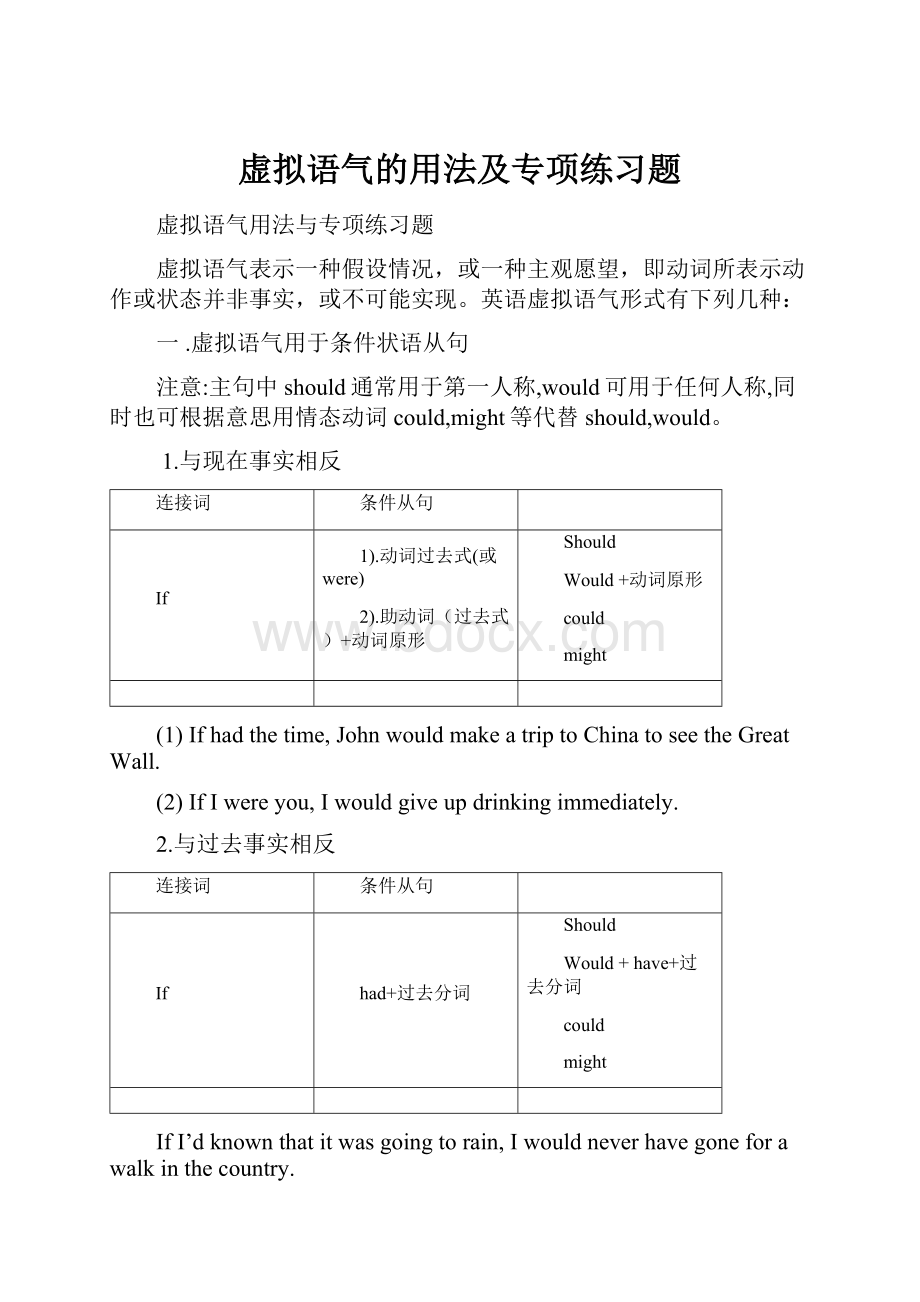虚拟语气的用法及专项练习题.docx
《虚拟语气的用法及专项练习题.docx》由会员分享,可在线阅读,更多相关《虚拟语气的用法及专项练习题.docx(11页珍藏版)》请在冰豆网上搜索。

虚拟语气的用法及专项练习题
虚拟语气用法与专项练习题
虚拟语气表示一种假设情况,或一种主观愿望,即动词所表示动作或状态并非事实,或不可能实现。
英语虚拟语气形式有下列几种:
一.虚拟语气用于条件状语从句
注意:
主句中should通常用于第一人称,would可用于任何人称,同时也可根据意思用情态动词could,might等代替should,would。
1.与现在事实相反
连接词
条件从句
If
1).动词过去式(或were)
2).助动词(过去式)+动词原形
Should
Would+动词原形
could
might
(1)Ifhadthetime,JohnwouldmakeatriptoChinatoseetheGreatWall.
(2)IfIwereyou,Iwouldgiveupdrinkingimmediately.
2.与过去事实相反
连接词
条件从句
If
had+过去分词
Should
Would+have+过去分词
could
might
IfI’dknownthatitwasgoingtorain,Iwouldneverhavegoneforawalkinthecountry.
3.与将来事实相反
连接词
条件从句
If
1. should+动词原形
2. 动词过去式
3、wereto+动词原形
Should
Would+动词原形
could
might
Ifitwereto/shouldraintomorrow,themeetingwouldbeputoff.
Ifyouwenttherenexttime,youwouldseewhatImean.
4.错综时间虚拟语气
当条件状语从句表示行为和主句表示行为所发生时间不一致时,动词形式要根据它所表示时间来调整。
例如:
IfIwereyou,Iwouldhavegonehome.
Ifyouhadfollowedthedoctor'sadvice,youwouldbequiteallrightnow.(从句说是过去,主句指是现在。
)
Iftheweatherhadbeenmorefavorable,thecropswouldbegrowingstillbetter.
状语从句
1.方式状语asif(asthough)
如果从句表示与现在事实相反,谓语动词用一般过去时;表示与过去事实相反,谓语动词用"had+过去分词";表示与将来事实相反,谓语动词用"would(might,could)+动词原形"。
例如:
(1)HelooksatmeasifIweremad.
(2)HespokeEnglishsofluentlyasifhehadstudiedEnglishinEngland.但asif(asthough)后从句也常用陈述语气,这是因为从句中情况往往是可能发生或可能被设想为真实。
例如:
Itlooksasifoursideisgoingtowin.
2.目状语inorderthat,sothat,lest,forfearthat等
从句谓语动词用"may/might,can/could)+动词原形"。
例如:
(1)Shelistenedcarefullyinorderthatshemightdiscoverexactlywhathewanted.
(2)Wehidbehindsomebushesforfearthatpasser-byshouldseeus.
3.连词引导条件状语从句:
incase,unless,supposing,providing,onconditionthat从句谓语动词用(should)或"might,could)+动词原形"。
二.虚拟语气用于宾语从句
1.Suggest,advise等动词之后宾语从句须用虚拟语气,其句子结构如下:
要求:
askdemandrequirerequestbegpleadinsistpraymaintainurge
建议:
suggestadviseproposerecommendmove
命令、决定:
ordercommanddecidedetermineresolve
其它:
consentdeservedesireintendprefer等后面宾语从句中+that…(should)+动词原形
注意:
在此结构中that不可省略;should省不省均可。
Hesuggestedthatthey(should)stopsmoking.
Theydemandedthattheblackpeopleshouldbetreatedaswellaswhitepeople.
如果that引导从句所表达内容是事实,也可用陈述语气。
Heinsiststhatheisright.
注意:
insist作"力言"、"强调"解时,宾语从句不用虚拟语气。
只有当insist作"坚持(应该)"解时,宾语从句才用虚拟语气。
例如
(1)Mikeinsistedthathehadneverstolenanything.
(2)Iinsistedthatyougivememymoneyback.
2."wish+宾语从句"表示不能实现愿望,汉语可译为"可惜……"、"……就好了"、"悔不该……"、"但愿……"等。
表示现在不能实现愿望,从句谓语动词用过去式;表示将来不能实现愿望,用"would(could)+动词原形";表示过去不能实现愿望,用"had+过去分词"或"(could)would+have+过去分词"。
例如:
wish用法
1).与现在事实相反:
动词过去式或were
Iwishwecouldgototheseasidetoday.
IwishIwereapopsinger.(=IamsorryIamnotapopsinger..)
2).与过去事实相反:
主语+wish(that)+主语+动词过去完成式
Wewishwehadarrivedtheretwohoursearlier.
IwishIhadneverstoppedteaching.(=IamsorryIstoppedteaching.)
3).与将来事实相反:
助动词过去式+动词原形
Iwishthey’dletusgetsomesleep.
注意:
wish与hope接宾语从句区别在于:
hope表示一般可以实现希望,宾语从句用陈述语气。
wish表示很难或不大可能实现希望,宾语从句用虚拟语气。
试比较:
Wehopetheywillcome,(Wedon’tknowiftheycancome.
Wewishtheycouldcome,(Weknowtheyarenotcoming.
3.虚拟语气在
wouldrather/wouldsooner/wouldjustassoon后接从句:
I'dratheryoupaidmenow.(从句用过去时指现在)
Iwouldrathertheycametomorrow.(从句用过去时指将来)
I'drathershehadn'tdonethat.(从句用过去完成时指过去)(此句中would可看作是表愿望实义动词)
三.虚拟语气用于主语从句
在主语从句中,谓语动词虚拟语气结构用"should+动词原形"结构,表示惊奇、不相信、惋惜、理应如此等。
例如:
Itisnecessary(appropriatecrucialdesirabledreadfulessentialimportantimproperincredibleindispensableinsistentnaturalpreferablepossibleprobableproperrightsignificantsurprisingstrangetragicurgentvitalwrongetc.)thatweshouldcleantheroomeveryday.
Itwasapity(ashame,nowonder,etc.)thatyoushouldbesocareless.
Itwillbedesired(suggested,decided,ordered,requested,
proposed,etc.)thatsheshouldfinishherhomeworkthisafternoon.
在上述三种主语从句中,should意为"应该"、"竟然",可以省去,但不可换用would。
主句所用动词时态不限。
注意:
这种从句表示是事实。
如果说话人对这种事实表示惊奇,就可用虚拟语气。
反之,如果不表示惊奇,that从句也可用陈述语气。
例如:
Itisstrangethathedidnotcomeyesterday.
Itisapitythatyoucan'tswim.
四.虚拟语气用于表语从句、同位语从句
要求:
demandrequestprayinsistencerequirement
建议:
suggestionadviceproposalrecommendationmotion
命令、决定:
ordercommanddecisiondeterminationresolution
其它:
plandesireideanecessitypreference等名词表语从句和同位语从句,其谓语动词要用虚拟语气结构"(should)+动词原形"。
例如
(1)Weallagreedtohissuggestionthatwe(should)gotoBeijingforsightseeing.
(2)Myideaisthathe(should)doexercisesfirst.
五、虚拟语气几种特殊用法
1.省掉if条件从句倒装结构:
Hadyouaskedme,Iwouldhavetoldyou.(=Ifyouhadaskedme,…)
2.有时虚拟条件不用条件从句而用不定式、分词、介词、名词、连接词或定语从句来表示,如:
Atruefriendwouldnotdosuchathing.(=Ifhewereatruefriend,he...)
(=Iftherewerenowater,…)
(=Ifyouhadn’thelpedme,…)
3.虚拟语气用于定语从句:
It’s(high)timethat…+动词过去式或should+动词原形,(should不能省略,be用were)"来表示,意为"(现在)该……"。
如:
It’stime(that)youhadahaircut.
It’shightime(that)wetooksomeaction.
4.虚拟语气用于ifonly引导感叹句:
IfonlyIhadtakenhisadvice.我要是听他话就好了。
IfonlyIwereabird!
我如果是一只鸟就好了。
5.虚拟语气用于简单句
1)表示说话人谦虚、客气、有礼貌,使语气委婉,常出现在日常会话中。
例如
(1)Itwouldbebetterforyounottostayuptoolate.
(2)Wouldyoubekindenoughtoopenthedoor?
2)用于一些习惯表达法中。
例如:
Wouldyoulikeacupoftea.
Youhadbettergonow.
3)用"may+动词原形",表示"祝愿"、"但愿"。
may须置于句首。
例如:
(1)Mayyoubehappy!
(2)Mayyousucceed!
6.含蓄条件句
在某些虚拟语气结构中没有if条件句,虚拟条件是用其它形式表示出来,这种现象在语法上称为"含蓄条件句"。
含蓄条件具体分为以下几种情况:
1)通过动词不定式短语表示条件。
例如:
Youwouldbeafooltorefusehisoffer.
(=Ifyoushouldrefusehisoffer,youwouldbeafool.)
要是你拒绝他建议,就太傻了。
2)通过介词短语表达条件。
例如:
ButforthestormIwouldhavearrivedmuchearlier.
(=Ifithadnotbeenforthestorm...)
要不是那场暴雨,我早就到达了。
Withoutair,therewouldbenolivingthings.Iwouldnothavesucceededbutforyourhelp.
3)通过连词otherwise,or,but,that,though,once等表达条件。
例如:
Shecametotownyesterday,otherwise/orIwouldnothavemether.
昨天她到城里来了,不然我就不会遇见她了。
(otherwise/or=ifshehadn'tcome)
Iwouldhaveattendedthemeeting,butIhavebeentoobusy.
(=...ifIhadnotbeentoobusy)
我本来要参加会议,只是太忙了。
4)通过Wereitnotfor...或Haditnotbeenfor...等句式表达条件。
意为"如果当时没有……",表示同过去事实相反假设。
例如Wereitnotfor(=Ifitwerenotfor)theleadershipoftheParty,wecouldnotliveahappylife.要不是党领导,我们不可能过幸福生活。
(与现在事实相反)
Haditnotbeenfor(=Ifithadnotbeenfor)theleadershipoftheParty,weshouldhavefailed.若不是有党领导,我们早就失败了。
(与过去事实相反)
5)通过分词短语表达条件。
例如:
Givenmoreattention,thetreescouldhavegrownbetter.倘若给予更多关心,这些树本来可以生长得更好。
(=Iftheyhadbeengivenmoreattention...)
6)无词句暗示条件。
例如:
Suchmistakescouldhavebeenavoided.这种错误本来可以避免。
(暗含条件从句ifwehadbeenmorecareful)
Itwassoquiet,youcouldhaveheardapindrop.是那样安静,掉根针你都听得见。
(暗含条件从句ifithaddroppedtotheground)
虚拟语气专项练习题
(1).IfIyou,Iwouldgobyplane.Flyingismuchfaster.
A.beB.wasC.wereD.am
(2).IdonotthinkthosepeoplearereallyEnglish.Iftheywere,theyspeakwithFrenchaccents.
A.don'tB.willnotC.mustn'tD.wouldn't
(3)today,wouldwebeabletogettherebyTuesday?
A.WereweleavingB.IfweleaveC.WouldweleaveD.Werewetoleave
(4).IfPetertomorrow,whatwouldyoudo?
A.werenottocomeB.willnotcomeC.wouldnotcomeD.hadnotcome
(5).“Shedidn'taskme,soIdidn'thelpher?
”
“Youmeantosay,youwould'vehelpedher?
”
A.ifsheaskedyouB.ifsheweretoaskyou
C.hadsheaskedyouD.wereshetoaskyou
6).Theytooktheinjuredstraighttothehospital.Otherwisesomeofthem.
A.mighthavediedB.mightdieC.woulddieD.coulddie
(7).Iftheyhadknownhim,tohim?
A.wouldtheyhavetalkedB.wouldtheytalk
C.hadtheytalkedD.theywouldtalk
(8).IfIlivedinthecity,Itravelledincrowdedbuses,butItoseelotsof films.
A.shallhaveto/shallbeableB.shallhaveto/amable
C.wouldhaveto/wereableD.wouldhaveto/wouldbeable
(9).Iwouldhavegonetotheconcert,ifItime.
A.hadhadB.havehadC.hadD.wouldhavehad
(10).Iknownit,Iwouldhavetoldyou.
A.HaveB.IfC.HadD.Having
(11).yourhelp,Iwouldnothavesucceeded.
A.BecauseB.BecauseofC.ButD.Butfor
(12).“WhatdidMrSmithsayabouthiscareer?
”
“Onlythatifheamillionaire,hewouldhavefewerworries.”
A.didnotbecomeB.hadnotbecomeC.doesnotbecomeD.hasnotbecome
(13).“Whydidn'tyouhelphim?
”
“IwouldhaveIdidn'thavethemoney.”
A.stillB.butC.otherwiseD.or
(14).“WhoshouldgotoseeLiYing?
Heisilltoday.”
“IsuggestWangHong.”
A.goesB.wouldgoC.goD.went
(15).Thehousemasterwasstrict.Herequestedthatwetelevisiononweek nights.
A.notwatchB.mustnottowatchC.notbewatchingD.havenotwatch
(16).Ican'tspeakJapanese,butIdowishI.
A.canB.couldC.hadD.speak
(17).“Areyouenjoyingyourstayhere?
’
“Yes,verymuch.IwishIhavetoleavesosoon.”
A.won'tB.don'tC.mustn'tD.didn't
(18).“Whatwillyoudoduringthesummerholidays?
”
“Idon'tknow,butit'sabouttimeonsomething.”
A.I'mdecidingB.I'lldecideC.IdecidedD.I'ddecided
(19).I'dratheryouanythingaboutitforthetimebeing.
A.sayB.didn'tsayC.don'tsayD.notsay
(20).“Whydoyouhavetobethereatsix?
”
“Theteacherdemandsthateveryoneinhisseatatsix.”
A.wouldbeB.canbeC.beD.willbe
(21).Hemakesanoteoftheassignmentlestheit.
A.forgetsB.forgetC.willforgetD.willnotforget
(22).“Howdoesthelibrarianact?
”
“Heactsasifheawalkingdictionary.”
A.wereB.beC.isD.hasbeen
23).Thereisalawthatdrunkendriversseverelypunished.
A.wereB.areC.beD.willbe
(24).IwishyouinterruptwhenI'mtalkingonthephone.
A.willnotB.wouldnotC.donotD.didnot
(25).Henrytalkstohisdogasifithim.
A.understandsB.understoodC.underst